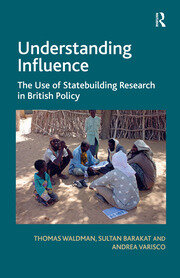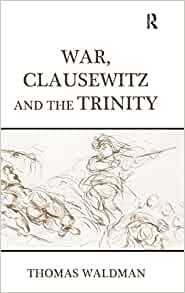Tom is Senior Lecturer in Security Studies.
His most recent book - Vicarious Warfare: American Military Strategy and the Illusion of War on the Cheap - was published by Bristol University Press in 2021. His first book - War, Clausewitz and the Trinity - interpreted Clausewitz's theory of war and related it to contemporary debates about the nature of modern conflict. Tom has also published widely on war, strategy, statebuilding, intra-state war, the research-policy nexus, Afghanistan and Clausewitz in edited volumes and peer-reviewed journals such as International Affairs; Survival, Contemporary Security Policy; Defence Studies; Parameters; Civil Wars; Journal of Statebuilding and Intervention; and Conflict, Security and Development.
Tom has experience working in conflict-affected countries including Kosovo, Bosnia, Sierra Leone, Liberia, Nepal and Afghanistan. He is member of the editorial board of the journal Contemporary Security Studies and the Palgrave book series Studies in Contemporary Warfare.
Tom has an ESRC-funded PhD in Politics and International Studies from the University of Warwick (2009), an MRes in Politics and International Relations (Distinction) and an MA in International Studies from Sheffield University, and a BA Hons in History from Newcastle University.
Tom's research focuses on contemporary security, war and geopolitics with a recent focus on US military strategy, security delegation and strategic narratives.
Tom currently teaches on the following modules:
- PIB800 - Dissertation
- PIP700 - Security in Global Politics
- PIP303 - Comparative Foreign Policy: Issues and Cases
- PIP704 - Dissertation in Security Studies
Tom welcomes PhD proposals in the areas of war theory, contemporary warfare, military intervention, strategy and grand strategy, defence policy, geopolitics, and US security.

Vicarious Warfare: American Strategy and the Illusion of War on the Cheap
Publisher: Bristol University Press (2021)
America has been at war for most of the 20th and 21st centuries and during that time has progressively moved towards a vicarious form of warfare, where key tasks are delegated to proxies, the military’s exposure to danger is limited, and special forces and covert instruments are on the increase. Important strategic decisions are taken with minimal scrutiny or public engagement.

Understanding Influence: The Use of Statebuilding Research in British Policy
Publisher: Routledge (2014)
With Barakat, S and Varisco, A
The overarching objective of this book is to analyse the manner in which statebuilding-oriented research has and can influence policies in fragile, post-conflict environments.
Book Chapters
- (2019) with Schreer, B. Strategy on autopilot: Resolute Support and the continuing failure of Western strategy in Afghanistan. In Tan, A. (Ed.) Terrorism and Insurgency in Asia. Routledge.
- (2014) with Kennedy, C. The Changing Nature of Intrastate War and the New Wars. In Newman, E. & DeRouen Jr, K. (Eds.). The Routledge Handbook of Civil Wars. Abingdon: Routledge.
- (2013) with Kennedy, C. Ways of War in the Twenty-First Century. In Beeson, M. & Bisley, M. (Eds.). Issues in 21stCentury World Politics. Basingstoke: Palgrave Macmillan.
Peer-Reviewed Journal Articles
- (2019) Strategic Narratives and US Surrogate Warfare. Survival, 61(1), 161-178.
- (2019) Buy now, pay later: American military intervention and the strategic cost paradox. Defence Studies, 19(1), 85-105.
- (2018) Vicarious Warfare: The Counterproductive Consequences of Modern American Military Practice. Contemporary Security Policy, 39(2), 181-205.
- (2017) with Barakat, S. Cumulative Influence: The Case of Political Settlements Research in British Policy. Policy Studies, 38(6), 640-663.
- (2014) Reconciliation and Research in Afghanistan: An Analytical Narrative. International Affairs, 90(5), 1049-1068.
- (2014) The Use of Statebuilding Research in Fragile States: Evidence from British Policymaking in Afghanistan, Nepal and Sierra Leone. Journal of Intervention and Statebuilding, 8(2-3), 149-172.
- (2013) with Barakat, S. Conflict analysis for the twenty-first century. Conflict, Security and Development, 13(3), 259-283.
- (2012) Clausewitz and the Study of War. Defence Studies, 12(3), 345-374.
- (2010) Politics and War: Clausewitz’s Paradoxical Equation. Parameters, 40(3), 1-13.
- (2010) Shadows of Uncertainty: Clausewitz’s Timeless Analysis of Chance in War. Defence Studies, 10(3), 336-368.
- (2007) British Post-Conflict Operations in Iraq: Into the Heart of Strategic Darkness. Civil Wars, 9(1), 61-86.
Online Publications
- (2021) Forward to the Past? Weigh Covert Options in Afghanistan Carefully. War on the Rocks, https://warontherocks.com/2021/09/forward-to-the-past-weigh-covert-options-in-afghanistan-carefully/
- (2021) Bidens’s Burden: Time for America to shake it’s addiction to waging war on the cheap. Transforming Society, https://bit.ly/3rjDB28
- (2017) The Counterproductive Consequences of America’s Vicarious Wars. Contemporary Security Policy blog, http://contemporarysecuritypolicy.org/the-counterproductive-consequences-of-americas-vicarious-wars/
- (2017) with Kennedy-Pipe, C. Ghost Wars: The War on Terror and those who are ‘Disappeared’. Remember Me: The Changing Face of Memorialisation, University of Hull, https://remembermeproject.wordpress.com/2017/08/30/ghost-wars-the-war-on-terror-and-those-who-are-disappeared/
- (2016) with Kennedy-Pipe, C. and Rogers, J. Drone Chic. Remote Control Project, http://remotecontrolproject.org/publications/remote-control-project-briefing-drone-chic/
- (2013) Clausewitz as Creative Director. e-International Relations, http://www.e-ir.info/2013/03/12/review-clausewitz-as-creative-director/
- (2013) Clausewitz and the Politics of War. Politics@York, University of York, http://uoy-politics.blogspot.com.au/search/label/war
- (2013) Continuity in Confusion: Understanding Clausewitz’s Trinity. Ballots and Bullets, http://nottspolitics.org/2013/12/03/continuity-in-confusion-understanding-clausewitzs-trinity-part-i/
Policy Reports
- (2015) with Barakat, S. Evaluation of Cluster Development Community Council (CCDC) Pilot Project. Report for the Government of Afghanistan and World Bank. 175 pages.
- (2014) with Barakat, S. and Varisco, A. Understanding Influence: Summary Report for DfID. Internal report for UK Department of International Development and the Economic and Social Research Council. 30 pages.
- (2011) with Barakat, S. Revising the SCA: Toward a Joint Framework for Conflict Analysis. Internal report for UK Department of International Development. 30 pages.
- (2009) Conflict Resolution, Peacebuilding and Youth. Internal report for Student Partnerships Worldwide. 31 pages.
- (2008) with Taylor, C. British defence policy since 1997. Research Paper for the UK House of Commons Research Service. 134 pages.
- (2008) with Taylor, C. British defence policy since 1997: background issues. Research Paper for the UK House of Commons Research Service. 46 pages.
- (2005) Conflict Dynamics in Cote D’Ivoire and the Mano River Region. Internal report for Oxfam GB in Dakar, Senegal. 86 pages.

